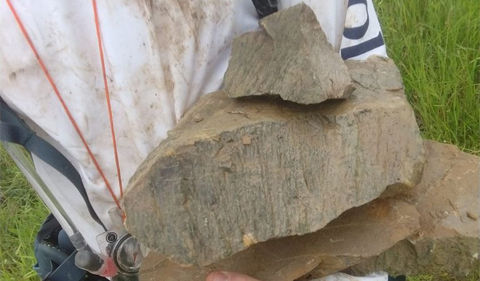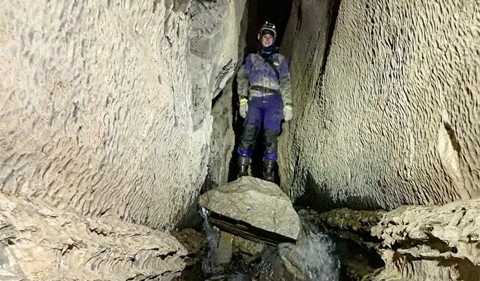The Geological Sciences Colloquium Series presents Lydia Albright and Logan Jacobs, Geological Sciences graduate students, discussing their research on Sept. 13 at 2 p.m. in Clippinger 205.
Albright presents “Hydraulic Modeling of Floods in an Open Conduit Caves.”
Abstract: The purpose of this study is to determine the major sources of energy loss in a narrow bedrock stream by continuously monitoring discharge and water surface profiles. The instrumental data will be used to create a hydraulic model of an open conduit, high gradient, narrow, slot canyon-like cave. This summer data was collected by creating a stage-discharge relationship, conducting cave surveys, and monitoring stream depths by deploying six pressure transducers in Fullers Cave in West Virginia. Hydraulic modeling can be used to better visualize floods, which can reproduce unobserved floods, and simulate flow in similar environments.

Logan jacobs, graduate student in Geological Sciences holds a handful of rocks collected from the Serpent Mound Impact Structure
Jacobs presents “Mapping the Central Uplift of the Serpent Mound Impact Structure.”
Abstract: The Serpent Mound Impact Structure represents the eroded remains of a complex crater. However, the original rim-to-rim diameter and timing of the impact event is not well known. The purpose of this study is to use a different morphometric approach to estimate the final crater diameter and utilize this information to further constrain the timing of the impact event.
Upcoming Colloquia
James Fox of Ohio University Geological Sciences on “The Blackhand Sandstone Member of the Cuyahoga Formation as a Gilbert Delta Deposit” and Sebastian Barkett of Ohio Univesity Geological Sciences on “Physical and Chemical Parameters Determining Bacterial Growth of Acid Mine Drainage Sites in Southeast Ohio” on Oct. 11 at 2 p.m. in Clippinger 205.
Shaolin Censullo of Ohio University Geological Sciences on “Did alternating dispersal and vicariance drive biodiversity increase during the Great Ordovician Biodiversification Event? A phylogenetic test using brachiopods” and Rex Cosgrove of Ohio University Geological Sciences on “Optimization and Analysis of the Effects of Temperature, pH, and Injection Techniques on a Slow-Release Permanganate Gel for DNAPL Remediation” on Oct. 18 at 2 p.m. in Clippinger 205.
Ryan Wolbert of Ohio Univerity Geological Sciences on “Effective remediation approach for improving acid mine drainage conditions using slow release hydrogen peroxide systems” and Ian Forsythe of Ohio University Geological Sciences on “Deliniating Species of Rafinesquina in the Type Cincinnatian: A Morphometric Approach” on Nov. 1 at 2 p.m. in Clippinger 205.
David Young of Ohio University Geological Sciences on “Stopping Plate Tectonics: the Caledonian Collision in Scandinavia” on Nov. 15 at 2 p.m. in Clippinger 205.
Xizhen Schenk of Ohio University Geological Sciences on “Balancing Climate and Land Use Changes with Limited Groundwater Resources of a Paleokarst Aquifer System” on Dec. 6 at 2 p.m. in Clippinger 205.




















Comments